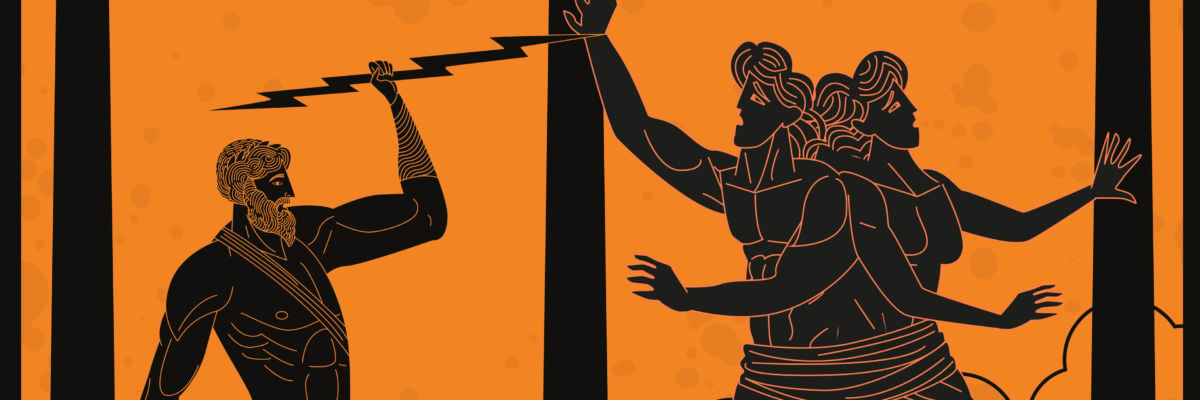
A commonplace criticism of religion in general and Catholicism in particular is its insistence on morality. No few modern people object to the connection between religion and morality, which they consider “judgmental,” perhaps even “hypocritical.”
Let’s consider that criticism more closely.
Yes, it’s true that Christianity in general as well as Judaism links religion and morality. We should be aware, however, what an enormous step forward that was in the understanding of what religion is and the purification of the concept of religion.
There are people who think all religion is mythology. Let’s pull that thread a little and compare Christianity with, say, Greek mythology. One way they obviously differ is that Christianity is monotheistic, whereas Greek mythology was polytheistic.
But there’s an even deeper difference: the God of Jesus Christ is connected to morality, whereas Zeus, Poseidon, Hades, et al. are not. The Greek gods are bigger and stronger than men, but not better. They rape, they cheat, they commit adultery, they lie, they seduce. Olympus is hardly heaven, and, although Hades had a particular zone for some miscreants—Tartarus—it was also a place where Zeus exacted revenge—e.g., on King Sisyphus for tattling about Zeus’s secret seduction of a lesser god’s daughter.
Compare that to the Christian gospel’s proclamation that “God is Love” (1 John 4:8). Not “God is like Love” or “God is loving,” but “God is Love,” so that the subject and predicate nominative of that statement are identical. Because he is Love, he cannot be but one Person, for Love gives itself. Because Divine Love is perfect, those three Persons (Love loving, Love loving back, and the intersection of that Love) do not in any way diminish the unity of the Godhead. On top of that, God gives himself to finite man by forming the latter in his “image and likeness” (Gen. 1:28).
Now—sloppy sentimentality aside—a God who is Love necessarily is a God connected with morality. Why? Because Love seeks its equal, its counterpart, its proper response. Love is true, and Love is good . . . consider the catalogue St. Paul provides (1 Cor. 13:4-8). But if all that is true, if Love = Good = Truth, then the free world of a God who is Love has to reckon with the real moral possibility that love will not be reciprocated, and will even be rejected. That is not and cannot be a matter of indifference. Love cannot make Anti-Love its equal.
For this same reason, the philosophy of nominalism—the philosophy that so influenced Martin Luther and the classical Protestant Reformers—is wrong. The nominalists argued that right and wrong are grounded not in truth—i.e., in intelligible reason (which has its source in God)—but merely in God’s will. If God’s will is almighty, the nominalists claimed, God can do whatever he wants morally, including making the Commandments the exact opposite of what they are. God could command rather than forbid murder, claimed the nominalists. Right and wrong are just labels God affixes by his almighty will.
Well, no.
God is not in contradiction to himself. A God who is Love and Truth and Good cannot make a world in which Non-Love and Lies and Evil are legitimate “options.” A God who is “the Way, the Truth, and the Life” (John 14:6) cannot make a world in which murder is allowed because he would deny himself, something Scripture says he cannot do (2 Tim. 2:13).
This brings us back to why, for Christianity, religion cannot be separated from morality. They cannot be separated not because God imposed morality as a checklist, but because of who God is. A God who is Love seeks to be in relation with other beings—including beings with moral capacity like men and angels—on the basis of the likeness of Love which is the likeness of Truth, Goodness, Life, Fidelity, etc., etc.
God, unlike Zeus, is not jealous of his divine prerogatives. Scripture, in fact, teaches that “he emptied himself” out of love to restore to goodness what human evil choice had ruined (Phil. 2:6-11).
Judaism makes similar points to Christianity. Judaism, in fact, broke with the religions of the world in which it grew up precisely because of its focus on morality.
Let’s take the story of Noah in Genesis. The Bible is not unique in speaking of some primordial flood: many cultures have a similar account. In ancient Babylon, for example, the Epic of Gilgamesh also has a flood account.
What is unique about the flood in Genesis is its motivation. God allows the flood because he “saw how great the wickedness of the human race had become and that every inclination of the thoughts of the human heart was only evil all the time” (Gen. 6:5). The preceding chapters of Genesis document the snowball effect of sin: man’s rejection of God’s command (3:6) quickly accelerates into murder (4:8), while pride corrupts the human heart.
God is also just. He holds man to account for his “wickedness,” and he differentiates between the good and the evil: “But Noah found favor in the eyes of the Lord” (6:8).
There is none of this in the Gilgamesh flood story. In that epic, the flood is unleashed because the Babylonian gods want to have some sort of sadistic fun with man, not unlike the perverted child who enjoys causing pain to little animals. Indeed, in Gilgamesh, the gods themselves also almost perish because, in their caprice, they seem to have forgotten where the turnoff valve is and are almost washed away. Babylon’s gods are like Greece’s: bigger but certainly not better.
Likewise, in Judaism, God’s relation to his people stands on moral terms: “You will be my people and I will be your God,” a choice made by love and sealed by a covenant, whose terms God wrote on stones that we call “the Ten Commandments.” These are not a set of rules God just dropped on Moses. They are the norms for the relationship, and it is on fidelity (or infidelity) to those freely assumed obligations that God judges Israel throughout the Old Testament.
Would you rather have a “religion” separate from “morality”? Then you’d trade the God of Abraham, Isaac, and Jacob for Zeus, with all his skullduggery, or for some Babylonian sadist.
So do you really think the nexus between religion and morality is so bad?



